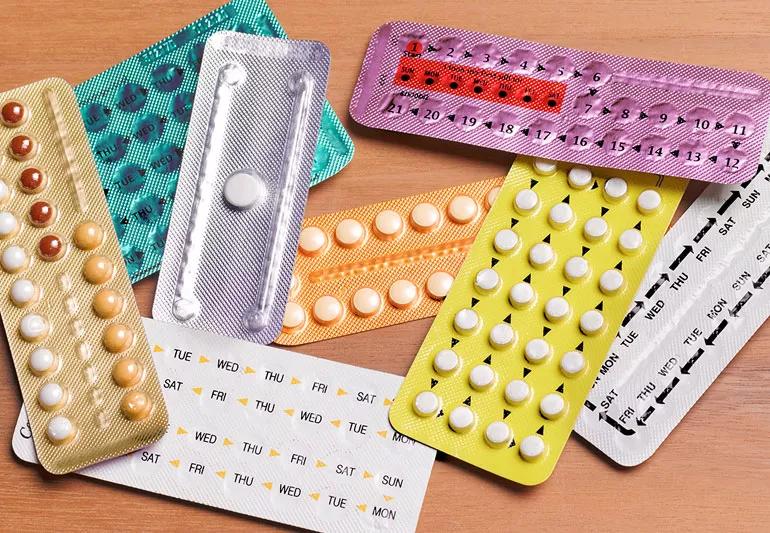The surprising connection between birth control and thyroid function

Image content: This image is available to view online.
View image online (https://assets.clevelandclinic.org/transform/98ca5828-129d-449d-a24a-63ef64b76f39/birthControlThyroid-835236446-770x533-1_jpg)
birth control pills and thyroids
The pill gets blamed for a LOT of things, but can birth control cause thyroid problems? “Whenever someone has a thyroid problem and is taking birth control pills, their healthcare provider should monitor their thyroid level,” says endocrinologist Alexandra Mikhael, MD.
Advertisement
Cleveland Clinic is a non-profit academic medical center. Advertising on our site helps support our mission. We do not endorse non-Cleveland Clinic products or services. Policy
Dr. Mikhael explains the connection between birth control pills and your thyroid.
The thyroid is the butterfly-shaped gland that sits at the base of your neck. Its high-profile job description includes secreting hormones — T4 (thyroxine) and T3 (triiodothyronine) — that control metabolism. Metabolism refers to the energy made and used by your body.
The pituitary gland is the thyroid’s partner in crime — it secretes a hormone called TSH (thyroid-stimulating hormone) that tells the thyroid to start making thyroid hormones. T4 is the main hormone secreted by the thyroid gland.
Thyroid hormones circulating in our bodies are bound to plasma proteins in the blood, called:
The thyroid hormones need the blood proteins to travel throughout your body. TBG is by far the major player in this process. Dr. Mikhael says that there is a fine balance between the free and bound thyroid hormone levels in our blood. It is the “free” or “unbound” T4 and T3 that exert the thyroid hormones’ effect on our bodies.
Can being on birth control affect your thyroid? The short answer is: Yes. Depending on the type of birth control you are started on and how you are taking it.
Advertisement
Birth control pills (oral contraceptives) containing estrogen or both estrogen and progesterone can alter that delicate balance of free and bound thyroid hormone in your body.
The estrogen in birth control pills increases the amount of thyroid binding proteins available to bind to thyroid hormone. What does this mean for you? If you have more thyroid hormone bound to proteins, you’ll have less free T4 in your body that’s able to do its job.
So, if you’re on birth control and you need medication for hypothyroidism, you might need a higher dose of thyroid medication to get to your normal thyroid levels. But if you stop taking the estrogen-containing pills, you may need a lower dose of thyroid medication.
Dr. Mikhael says that starting birth control can affect your thyroid if you have an underlying thyroid disorder. She adds that TBG starts to increase around two weeks after starting oral contraceptives.
The thyroid hormone levels reach a steady state within four to eight weeks. In those with hypothyroidism who are treated with thyroid hormone and in pregnant people, an increase of the thyroid hormone dosage is required to maintain normal TSH levels. “Anyone who is taking thyroid medication, whether it’s levothyroxine (synthetic T4) or liothyronine sodium (synthetic T3), should be monitored for six to eight weeks after the oral contraceptives are started.”
Dr. Mikhael says other forms of hormonal birth control like skin patches don’t have the same issues — research hasn’t shown any connection to increases in thyroid-binding proteins. “It’s mainly oral estrogen with or without progesterone that causes these effects.”
Even if you don’t have an existing thyroid condition, birth control can affect thyroid test results. For example:
“Many studies show that oral contraception tends to have a greater effect on thyroid tests than other forms of birth control, but it’s usually mild,” notes Dr. Mikhael. “But there’s no evidence that contraceptive methods trigger or cause thyroid problems if you don’t have an underlying thyroid issue.”
Some data suggests that abnormal thyroid function may affect how well birth control works —whether you’re on it for period regulation or pregnancy prevention, says Dr. Mikhael. “That’s why you should talk to your provider before starting any medication. If you have any reason to suspect a thyroid disorder, get it addressed and treated.”
Advertisement
Advertisement

Sign up for our Health Essentials emails for expert guidance on nutrition, fitness, sleep, skin care and more.
Learn more about our editorial process.
Advertisement
Inclusion is at the heart of women’s health
A gynecologist shares what you can do (and what you can skip)
These steps can boost your well-being and protect your health (and energy!) for years to come.
If you’re considering stopping yours, here’s what to know
Trying to do it all is making us more stressed than ever
How to beat burnout and ask for help
A GP should check your health, evaluate your cardiovascular risk
Not being active now can lead to problems later
Type 2 diabetes isn’t inevitable with these dietary changes
Applying a hot or cold compress can help with pain
Pump up your iron intake with foods like tuna, tofu and turkey